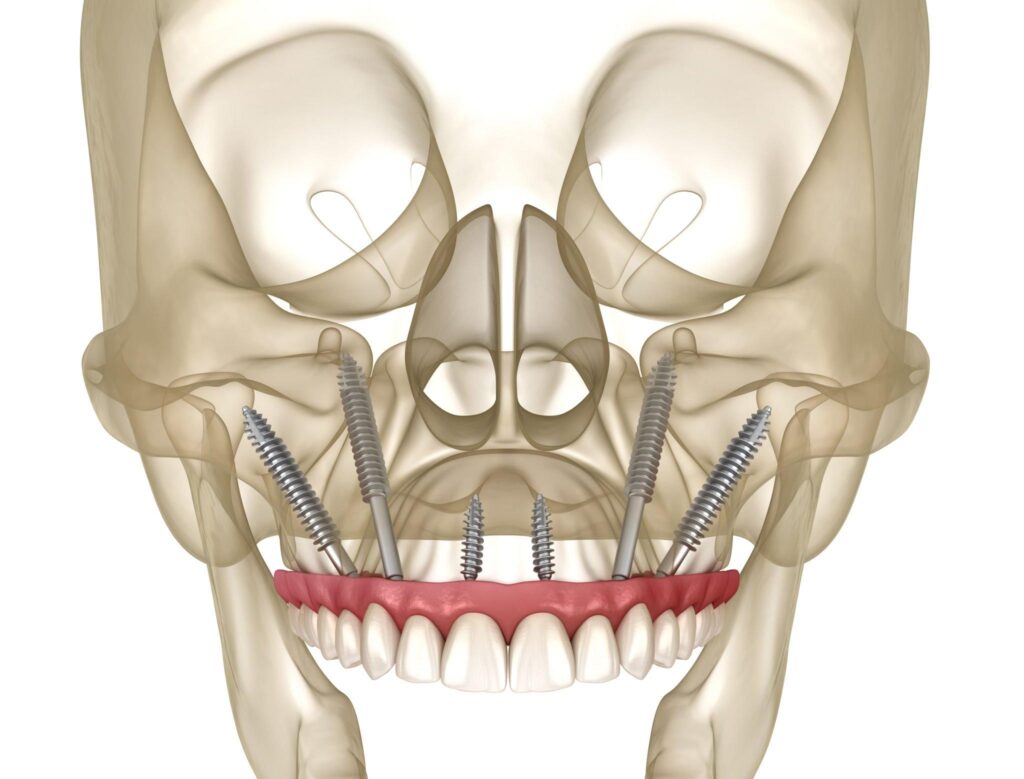Dental implants are an ideal solution for those who want to restore their teeth and regain their beautiful smile. However, the cost of dental implants has always been a concern for many people. The cost of dental implants varies depending on the number of teeth that require implants and the quality of the implant used. In this article, we will break down the cost of dental implants to help you understand what to expect.
One of the most common dental implant treatments is the single-tooth implant, and its cost can range from $1,500 to $6,000. The complexity of the procedure and the type of implant material used will significantly impact the cost. For a full mouth of dental implants, which requires placing several implants, the price can range from $25,000 up to as high as $100,000.
A newer alternative to traditional implant materials is the one-piece zirconia implant, which has become popular due to its higher biocompatibility and durability. The cost of this type of implant is usually higher than traditional implants and usually ranges from $1,500 to $4,500 per tooth.
Several factors affect the overall cost of dental implants. One of these is bone grafting, a surgical procedure in which bone material is added to the jawbone to provide support for the implant. This procedure is required when there is bone loss and the jawbone cannot support the implant.
The cost of bone grafting can range from $200 to $3,000, depending on the extent of the procedure required.
Dental crowns are another factor that can influence the cost of dental implants. Crowns are placed on top of the titanium post to create the artificial tooth. The cost of a dental crown usually ranges from $500 to $3,000 per tooth.
Additional costs may arise if adjacent teeth require repair before implant treatment, which can range from $300 to $2,000 per tooth. Another possible additional cost is the need for a sinus lift, which is a surgical procedure that involves adding bone to the upper jaw near the sinus cavity. The cost of this procedure can range from $1,500 to $5,000.
The cost of dental implants can be influenced by factors such as the number of teeth needed, the type of implants used, any additional procedures needed, and the location of the dental practice. It’s advisable to seek advice from your dental practitioner to find the most suitable solution for your budget and dental requirements.
Invest in Yourself: The Benefits of Dental Implants
Dental implants are a smart investment for oral and overall health, self-esteem, and financial future despite the high initial cost.
What are Zygomatic implants?
Zygomatic implants are a type of dental implant that is longer than traditional dental implants. Zygomatic implants are typically used in cases where conventional dental implants cannot be used due to severe bone loss. Unlike traditional implants, which are placed in the jawbone, zygomatic implants are anchored in the cheekbone, or zygomatic bone.

Zygomatic implants necessitate more expertise and training for placement than conventional dental implants due to their distinctive positioning. Therefore, not all dental professionals possess the necessary qualifications to perform zygomatic implant placement.
The cost of zygomatic implants can be higher than that of traditional dental implants for several reasons. One factor is the increased length of the implant, which requires more advanced materials and techniques. Additionally, the placement of zygomatic implants requires more time and expertise than traditional dental implants, which can contribute to a higher overall cost.
Benefits of zygomatic implants include the ability to replace missing teeth in areas where bone loss has occurred, without the need for bone grafting. Zygomatic implants can be a more comfortable solution for those who struggle with traditional dentures, as they do not place pressure on the gums or other soft tissues. Zygomatic implants also typically offer a high success rate and can last for many years with proper care.
Overall, zygomatic implants provide an effective solution for individuals with severe bone loss who require dental implants. While they may be more expensive than traditional dental implants, they offer unique benefits and can provide a long-lasting solution for those in need.
Does Dental Insurance Cover Dental Implants?
Dental implants are a popular option for replacing missing teeth and restoring oral health. However, many patients are curious about whether dental insurance covers the cost of implants. The answer is not a simple one, as it varies depending on the individual’s dental insurance plan and coverage limitations.
While some dental insurance plans cover implants, typically, the extent of coverage for dental implants is limited compared to other dental treatments. Coverage limitations often include only covering the cheapest option for implant placement, leaving the patient to cover any additional costs associated with the procedure. Additionally, some insurance companies may choose to exclude dental implants from coverage entirely, leaving the patient with the burden of paying for the complete cost of the implant and the procedure.
However, certain conditions may affect whether dental insurance providers cover implants. One example is if the implant is required for medical necessity due to bone loss or gum disease. In these cases, insurance companies are more likely to consider coverage for dental implants. Still, even in such cases, the amount of coverage provided varies considerably between different insurance providers.
Patients can still expect a significant portion of the dental implant cost to be their responsibility, even with coverage. It’s therefore essential to research and understand one’s insurance policy’s limitations and exclusions before undergoing any implant procedures to accurately predict how much they’ll need to pay out of pocket.
In summary, dental insurance plans may or may not cover dental implants, and the extent of coverage can vary significantly between different insurance companies and policies. Patients must do their homework, including checking with their dental insurance provider, to understand the coverage they can expect for dental implant procedures. Even with the insurance coverage, there is still the likelihood that a portion of the overall dental implant cost may fall as the responsibility of the patient.
Do not allow concerns about pricing to prevent you from obtaining the necessary implants
Although dental implants may have a high initial cost, they offer long-term advantages that justify the investment in your oral health. They are a preferable option to removable restorations like dentures or bridges, which often need frequent upkeep or replacement. Don’t let concerns about price deter you from receiving the dental implants you require.
The dental implant process involves several steps, including an initial consultation and a comprehensive assessment of your bone structure. Dental implants are made of durable and biocompatible materials such as titanium and zirconia, ensuring their longevity and natural-looking appearance.
At our practice, we understand that the cost of dental implants may be a concern for some patients. That’s why we offer financing options that allow you to manage the cost of treatment. We provide payment plans that are tailored to your budget and needs, rather than relying on dental insurance providers that may not cover the full cost of your implants or may have strict requirements for coverage.
By investing in dental implants, you can enjoy the benefits of a permanent and functional solution that mimics the look and feel of natural teeth. Don’t let price fears hold you back from achieving optimal oral health and restoring your confidence with a beautiful smile. Contact our dental practice today to learn more about our financing options and how we can assist you in your dental implant journey.
How long do the benefits of dental implants last?

Dental implants are a popular and effective solution for missing teeth. They provide numerous benefits, including improved oral health, better speech and chewing abilities, and increased confidence in your smile. However, it is important to consider the longevity of these benefits before undergoing the dental implant procedure.
Pros of Dental Implants
Dental implants are an excellent option for those seeking to restore the function and appearance of missing teeth. Unlike traditional dentures, implants are surgically placed into the jawbone, providing a strong foundation to support an artificial tooth or crown.
One of the many benefits of dental implants is the preservation of the health of the jawbone and gums. Without a tooth root to anchor them in place, the jawbone and gum tissue can deteriorate over time, leading to a variety of additional oral health issues. By providing a secure anchor point for the implant post, the jawbone and gums are protected from deterioration.
Another significant advantage of dental implants is their ability to prevent nearby teeth from shifting out of their proper position. Missing teeth can lead to uneven pressure on the remaining teeth, causing them to shift and potentially leading to misalignment and additional oral health problems. Implants provide the necessary support to ensure that nearby teeth remain in their natural position.
When it comes to materials for dental crowns, there are several options available, each with varying levels of durability and longevity. Porcelain-fused-to-metal, layered zirconia, full dental gold, resin composites, and zirconia are all popular choices. However, the sturdiest and longest-lasting options are layered zirconia and full dental gold, which can last for up to 30 years with proper care.
Compared to traditional dental crowns or artificial teeth, which may only last for 10-20 years, dental implants are highly durable and long-lasting. With proper care, implants can last for many years, making them an excellent investment in your oral health and overall well-being.
In conclusion, dental implants offer a multitude of benefits, including improved function and appearance, the preservation of the jawbone and gum tissue, and the prevention of nearby teeth from shifting. With a variety of materials available for dental crowns, implants can provide a long-lasting solution to missing or damaged teeth.
Cons of Dental Implants
While dental implants offer numerous benefits, it’s important to consider the potential drawbacks before deciding on this procedure. One significant risk is the potential for damage to nearby teeth and gums during implantation. Improper placement or a lack of proper oral care can lead to infection or misalignment, which can result in further complications.
Another concern is the possibility of damage to the sinuses or jawbone during the implant procedure. A sinus lift may be required if there isn’t enough bone present to support the implant. This surgical procedure can increase the risks of complications and extend the recovery time.
There is also a risk of nerve damage during the implant procedure, which can lead to numbness or tingling in the face and mouth. This risk is greater for implants in the lower jaw.
Implant failure due to infection or misalignment is a possibility, which can lead to the need for additional procedures or even removal of the implant. It’s important to discuss potential risks with your dental professional and follow proper oral care protocols to ensure the success of the implant.
In addition to the risks associated with implantation, the materials used for the crown can impact the longevity of the implant. While there are several options available, the average lifespan of a crown is significantly less than that of a dental implant. This means that the crown may need to be replaced before the implant itself, which can add additional cost and time to the process.
When considering materials for the crown, zirconia and dental gold are two options that offer greater durability and longevity. Zirconia is known for its strength and natural appearance, while dental gold has been used for decades and is one of the most durable options available. It’s important to discuss crown materials with your dental professional to determine the best option for your specific needs and situation.
Overall, while dental implants offer numerous benefits, it’s important to carefully consider the potential drawbacks and risks before deciding on this procedure. By working with a qualified dental professional and following proper oral care protocols, you can help ensure the success and longevity of your dental implant. So, before deciding on a dental implant, make sure to educate yourself and seek the guidance of a qualified dental professional.
FAQs
How long do dental implants last?
The longevity of a dental implant depends on several key factors, including the placement procedure, the patient’s oral health and hygiene habits, and the overall health of the jawbone. In general, dental implants have a very high success rate, with over 95% of implants lasting 10 years or more.
Are dental implants safe?
Dental implants are a safe and effective solution for missing teeth, as long as the procedure is performed correctly. The success rate of dental implants is extremely high, with most patients experiencing successful results. In fact, research shows that dental implants can last up to 25 years or longer with proper care and maintenance.
Before getting dental implants, it’s important to discuss all risks and potential complications with your dental professional. You will also need to undergo a detailed examination to determine if you’re a suitable candidate for the procedure.
What are same-day dental implants?
Same-day dental implants, also known as immediate load implants, are a type of dental implant procedure that differs from traditional implant procedures in significant ways. Unlike conventional implants, which require a period of healing before a dental prosthetic can be attached, same-day implants allow a crown, bridge, or prosthesis to be placed on the implant on the same day it is inserted.
How do dental implants work?
Dental implants are a popular solution for those who are missing teeth. They work by inserting a metal post or frame into the jawbone beneath the gums. This post acts as a new tooth root, providing a stable and secure anchor for a dental crown, bridge, or denture.
Do dental implants hurt?
One of the most common concerns about getting dental implants is the level of pain that comes with the procedure. While it’s natural to be worried about the potential for pain, the good news is that you will be anesthetized during the procedure, meaning you won’t feel any pain at all.
Of course, it’s important to note that there may be some discomfort after the procedure is complete. This can include soreness at the implant site, which is a natural part of the healing process. However, any discomfort can usually be managed with over-the-counter pain relievers or a prescription from your dental professional.
What are alternatives to dental implants?
While dental implants have become a common solution for tooth loss due to their effectiveness and long-lasting results, they are not the only option available. Dental bridges and partial dentures are common alternatives that can provide varying levels of restoration for those who are missing teeth.







Thanks